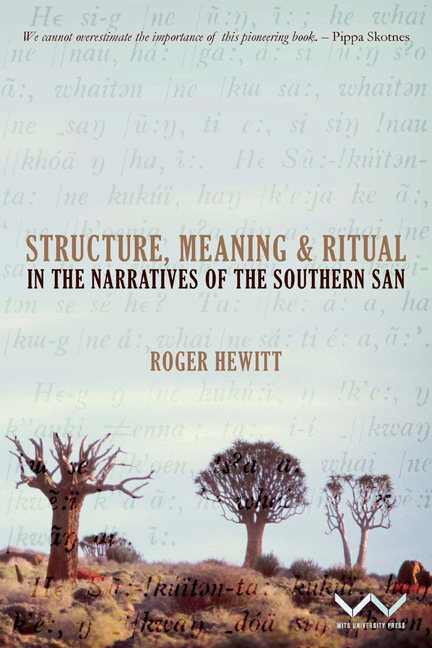Book contents
- Frontmatter
- Dedication
- Contents
- Acknowledgements
- Introduction
- 1 Ethnographic background
- 2 Introduction to the narratives: their context, performance and scope
- 3 Legends and the stories of !Khwa
- 4 Sidereal narratives: the story of the Dawn's Heart and his wife the Lynx
- 5 Animal narratives
- 6 |Kaggen in belief and ritual
- 7 The |Kaggen narratives (1): characters and content
- 8 The |Kaggen narratives (2): sequence and structure
- 9 |Kaggen in belief, ritual and narrative: a synthesis
- 10 Two |Kaggen narratives: compositional variations
- 11 The verbal surface: a note on the narrators
- Appendix A Girls’ puberty observances of the ǀXam
- Appendix B The shamans of the ǀXam
- Bibliography
- Index
9 - |Kaggen in belief, ritual and narrative: a synthesis
Published online by Cambridge University Press: 21 April 2018
- Frontmatter
- Dedication
- Contents
- Acknowledgements
- Introduction
- 1 Ethnographic background
- 2 Introduction to the narratives: their context, performance and scope
- 3 Legends and the stories of !Khwa
- 4 Sidereal narratives: the story of the Dawn's Heart and his wife the Lynx
- 5 Animal narratives
- 6 |Kaggen in belief and ritual
- 7 The |Kaggen narratives (1): characters and content
- 8 The |Kaggen narratives (2): sequence and structure
- 9 |Kaggen in belief, ritual and narrative: a synthesis
- 10 Two |Kaggen narratives: compositional variations
- 11 The verbal surface: a note on the narrators
- Appendix A Girls’ puberty observances of the ǀXam
- Appendix B The shamans of the ǀXam
- Bibliography
- Index
Summary
In Chapter 6 it was observed how, in the religious beliefs of the ǀXam, ǀKaggen had a creative aspect which was beneficial to man, and another aspect, opposed the human world, which acted in the interests of various game animals. In his creative aspect he had the attributes of a transformer of the world: he was credited with making the moon, creating the game animals and having named places. His negative aspect was, in part, complementary to this for he protected the animals which he had created and attempted to prevent the ǀXam hunters from killing them. However, young mothers and hunters both needed to be guarded against him.
In the narratives these two aspects are also present. ǀKaggen, the creative if incidental benefactor, actually helps those whose lives are endangered, both in the narratives of group B and in two narratives of group A (M6, M10). The belief that he created the game animals is given narrative form in M1 where he creates the eland, and the belief that he made the moon is also turned directly into narrative in one conclusion to that same story. In belief and narrative he is always for life even if the order which humans attempt to place on life is anathema to him. His constant fighting, anti-social behaviour, economic irresponsibility and outrageous boastfulness, seen everywhere in group A, are clearly also a reflection of the kind of being he was. Indeed the thematic pairs Life/Death and Social/Non-Social, found in the narratives, may also be seen to be present in the purely religious aspect.
The position ascribed to ǀKaggen on the borderline between amenable and unamenable nature was a corollary of his marginality with regard to the moral and empirical universe articulated in the narratives. In religious belief and observance ǀKaggen stood for the world of game animals and sought to exclude the influence of men. In other superstitions and religious beliefs of the ǀXam the autonomous ‘wildness’ of game – game acting in strange and unpredictable ways which put them beyond the hunters’ skills – was causally related to many disruptive social events, from unruly behaviour in the camp on the part of women and children, illness or a death in the band, to a glance from the eye of a menstruating girl or failure to observe certain eating rules known as !nanna-se (Bleek & Lloyd 1911: 270ff).
- Type
- Chapter
- Information
- Publisher: Wits University PressPrint publication year: 2008



